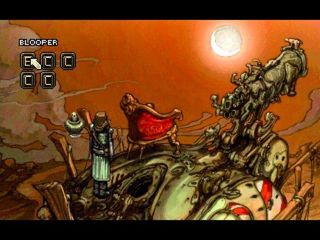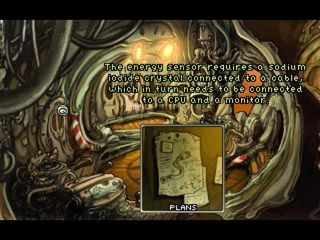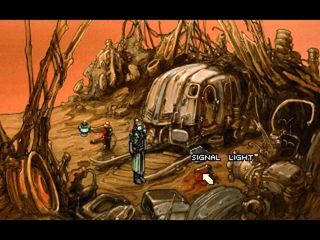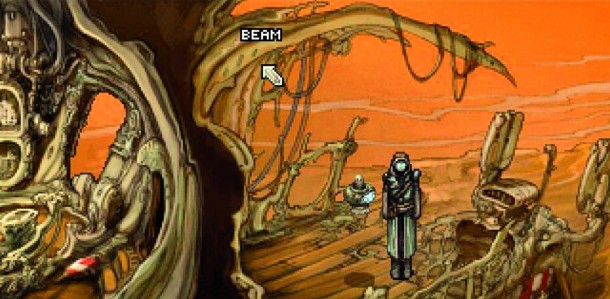Our Verdict
Primordia starts abruptly and ends just as suddenly, and the good story that were teased with doesnt quite ever get told.
PC Gamer's got your back
Review by Ben Griffin
Humans are a distant memory. Rugged robot Horatio Nullbuilt (Bastion's narrator Logan Cunningham) passes the days studying the Book of Man and trading quips with his sassy droid Crispin, or traversing the desert on the lookout for scraps to maintain his beaten-up spaceship, the Unniic. But then their peacefully nomadic existence is shattered by the rogue robot Scraper – who steals the Unniic's energy core – and they're launched on a quest to retrieve it.
Primordia takes cues from its mentors, point-and-click maestros like Revolution Studios and LucasArts, and this is most keenly felt in a slick, concise interface: there's an inventory used to combine items, a datapad storing lore, a cursor highlighting clickable objects, and a map that fast-travels you between environments. Controls are elegant too, using left-clicks to interact with hotspots and right-clicks for descriptive passages on them. The undemanding interactivity makes Primordia the gaming equivalent of curling up with a good book.
Unfortunately, such a debt to tradition means that the game is deliberately old-school, so while the art is at least cohesive – presenting a world intentionally drab and ruined – it's more pixellated than a face on Crimewatch. This is a corroded and claustrophobic world that I simply don't want to inhabit, and for a point-and-click game where each screen is to be pored over, that's a problem.

Elsewhere are bugbears familiar to the genre. Early on, you're tasked with repairing your ship, collecting bits and bobs from a desert scrap yard and combining them in your inventory. It turns out you can use putty on a conduit but not conduit on a putty. This leads to the age-old fallback – clicking on everything you have in the vain hope that something will slot together.
Puzzles suffer from inconsistency. Crispin can fetch you metal rods despite having no arms, but can't knock a halogen lamp from a perch. When puzzles do work as expected, they often lack pizzazz or the thrill of ingenuity. There's nothing exciting about figuring out how to bypass a password to open a door.
The animation is also decrepit, with the lack of frames leading to characters that look like they've lurched straight out of Habbo Hotel. This is more than just a visual thing. In a genre where mechanics are so often rote, good world-building is a crucial element. One of the ways you help your audience connect with a world is through animation.

Once you hit the heaving city of Metropol, Horatio's musings on metaphysics provide a philosophical spark but the visuals remain underwhelming and the puzzles even more so.
Primordia is thus a mixed bag, succeeding in the basics but failing when it comes to the finer detail. There's something promising here, but it's doomed like humanity to be a distant memory.
◆ Expect to pay: $11 / £7
◆ Release: Out now
◆ Developer: Wormwood Studios
◆ Publisher: Wadjet Eye Games
◆ Multiplayer: None
◆ Link: www.wadjeteyegames.com

Primordia starts abruptly and ends just as suddenly, and the good story that were teased with doesnt quite ever get told.
PC Gamer is the global authority on PC games—starting in 1993 with the magazine, and then in 2010 with this website you're currently reading. We have writers across the US, Canada, UK and Australia, who you can read about here.

